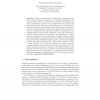Free Online Productivity Tools
i2Speak
i2Symbol
i2OCR
iTex2Img
iWeb2Print
iWeb2Shot
i2Type
iPdf2Split
iPdf2Merge
i2Bopomofo
i2Arabic
i2Style
i2Image
i2PDF
iLatex2Rtf
Sci2ools
RTA
2005
Springer
2005
Springer
The Algebra of Equality Proofs
Proofs of equalities may be built from assumptions using proof rules for reflexivity, symmetry, and transitivity. Reflexivity is an axiom proving x=x for any x; symmetry is a 1-premise rule taking a proof of x=y and returning a proof of y=x; and transitivity is a 2-premise rule taking proofs of x=y and y=z, and returning a proof of x=z. Define an equivalence relation to hold between proofs iff they prove a theorem in common. The main theoretical result of the paper is that if all assumptions are independent, this equivalence relation is axiomatized by the standard axioms of group theory: reflexivity is the unit of the group, symmetry is the inverse, and transitivity is the multiplication. Using a standard completion of the group axioms, we obtain a rewrite system which puts equality proofs into canonical form. Proofs in this canonical form use the fewest possible assumptions, and a proof can be canonized in linear time using a simple strategy. This result is applied to obtain a si...
Equivalence Relation | Minimal Proofs | RTA 2005 | Rule Taking Proofs | Theoretical Computer Science |
Related Content
| Added | 28 Jun 2010 |
| Updated | 28 Jun 2010 |
| Type | Conference |
| Year | 2005 |
| Where | RTA |
| Authors | Aaron Stump, Li-Yang Tan |
Comments (0)

